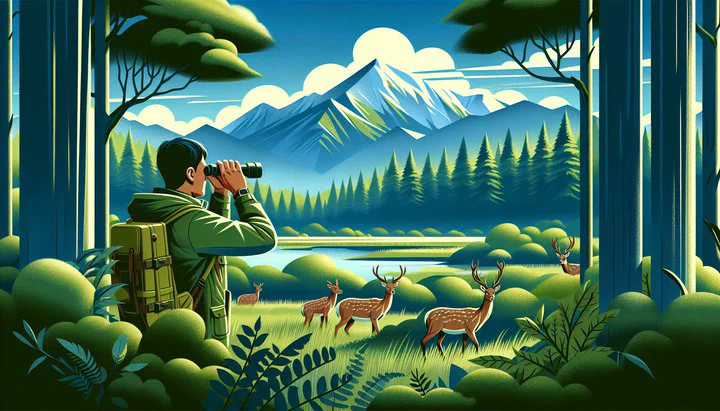Career in Wildlife Biology

Exploring Wildlife Biology Careers
Have you ever wondered what it would be like to work with animals in their natural habitats, studying the way they live and interact with their environment? That’s the exciting world of wildlife biology! Wildlife biology is the study of animals and their ecosystems. It’s super important because it helps us understand how different species live, how they impact their environment, and how we can protect them.
There are several wildlife biology career opportunities for those interested in this field. One of the most common roles is a wildlife biologist. Wildlife biologists are like detectives of the animal world. They watch animals, gather data, and learn how animals interact with their environment. Other career paths include becoming a conservation scientist or an environmental consultant. Conservation scientists work to protect natural resources and make sure we use them wisely. Environmental consultants help businesses and governments make decisions that are good for the environment.
Working in wildlife biology can take you to many cool places. You might find yourself in a forest, on a mountain, or even in a laboratory. Wildlife biologists often work for government agencies, research institutions, or conservation organizations. The key responsibilities in these roles can vary, but they generally include doing research, collecting samples, and teaching the public about the importance of wildlife conservation in biology. Each role plays a part in helping us understand and protect the natural world.
If you’re passionate about animals and the environment, a career in wildlife biology might be the perfect path for you. It’s a field filled with discovery and the chance to make a real difference in the world.
Pursuing a Degree in Wildlife Biology
If you’re excited about a career in wildlife biology, the first step is getting the right education. Pursuing a degree in wildlife biology usually starts with a bachelor’s degree in a related field. You’ll want to focus on subjects like ecology, zoology, and environmental science. These courses teach you about animals, their habitats, and the ecosystems they live in.
With more education, you can learn more about the animals you love and focus on what you find most interesting. Many wildlife biologists go on to earn a master’s degree or even a Ph.D. Higher education can open up more wildlife biology career opportunities.
But it’s not just about the classes you take. Practical experience is also crucial. Internships and fieldwork give you hands-on experience with animals and their environments. These opportunities allow you to apply what you’ve learned in the classroom to real-world situations. You might find yourself working in national parks, wildlife reserves, or research labs, gaining valuable skills that will help in your future career.
Don’t worry if this all seems like a lot—every journey starts with a single step, and there are many people and resources to help you along the way. Developing strong skills in data analysis, communication, and problem-solving is important, too. Wildlife biologists often need to present their research findings, so being able to clearly explain your work is essential. Whether you’re talking to other scientists or educating the public, these skills will help you succeed.
By focusing on both education and practical experience, you’ll be well-prepared to enter the world of wildlife biology. With dedication and hard work, you can make a significant impact on the natural world and contribute to the importance of wildlife conservation in biology. Once you’ve got the right education and experience, you’ll be ready to join the exciting world of wildlife conservation.
Wildlife Biology Job Outlook and Importance of Conservation
As you consider a career in wildlife biology, understanding the job market is crucial. The wildlife biology job outlook shows steady demand for professionals dedicated to studying and protecting our planet’s diverse ecosystems. While the field is competitive, there are many opportunities for those with the right education and experience. Careers in wildlife biology often involve working with government agencies, non-profit organizations, and research institutions focused on conservation efforts.
The importance of wildlife conservation in biology cannot be overstated. Conservation efforts are vital for protecting endangered species and preserving natural habitats. This, in turn, creates more job opportunities as new projects and initiatives are developed to address environmental challenges. Wildlife biologists play a key role in these efforts by doing research, developing conservation plans, and educating the public about the importance of protecting our natural world.
Organizations like the World Wildlife Fund and The Nature Conservancy are at the forefront of conservation work. These groups undertake projects that aim to protect species and habitats, offering roles for wildlife biologists to contribute their expertise. These projects not only help protect biodiversity but also create job openings for passionate individuals looking to make a difference.
As you explore the wildlife biology job outlook, you’ll see many exciting paths opening up for those who care about animals and the environment. The future of wildlife biology careers looks promising, especially as global awareness of environmental issues grows. As the world continues to recognize the urgent need for conservation, the demand for skilled wildlife biologists is likely to increase. This means more opportunities to engage in meaningful work that impacts both local and global ecosystems.
If you’re committed to making a positive impact on the environment, now is a great time to pursue a career in wildlife biology. By choosing a career in wildlife biology, you’re not just building a career—you’re becoming a hero for the planet and its creatures. By focusing on conservation, you can help ensure that future generations enjoy the rich biodiversity our planet has to offer.